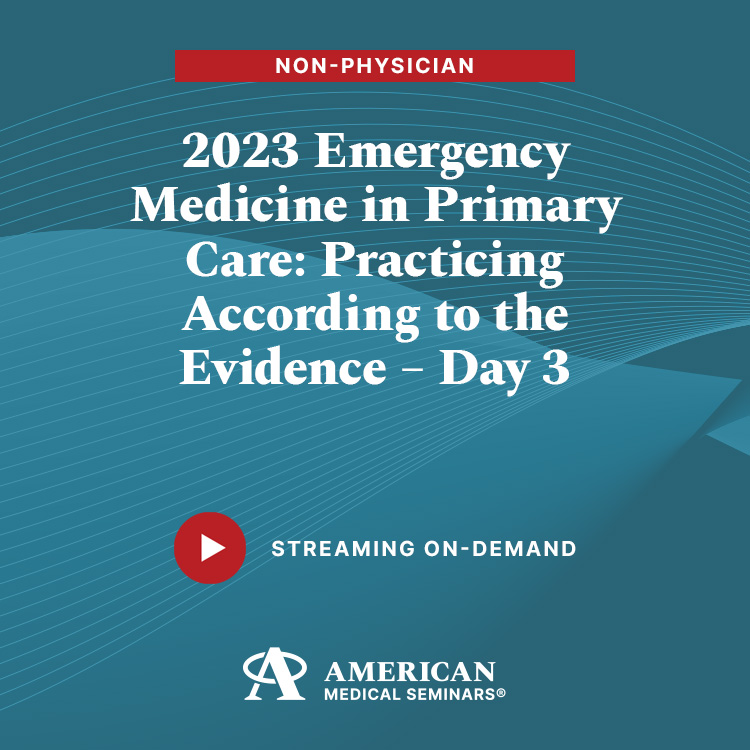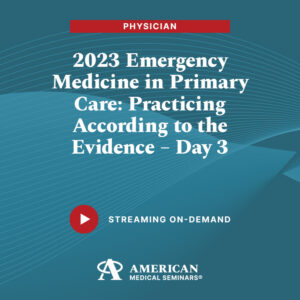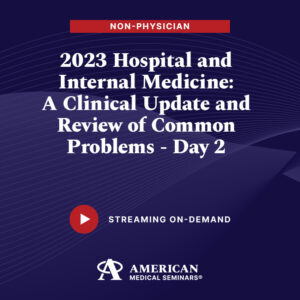Title: 2023 Emergency Medicine in Primary Care: Practicing According to the Evidence – Day 3 (Non-Physician)
Faculty: Bryant Allen, M.D., F.A.C.E.P., F.A.A.E.M.; Andrew D. Perron, M.D., F.A.C.E.P., F.A.C.S.M.; and Michael E. Winters, M.D., M.B.A., F.A.C.E.P., F.A.A.E.M.
Release Date: 7/1/2023 Expiration Date: 7/1/2026
Day 3
Minor Closed Head Injury: An Evidence-Based Approach.
Upon completion of this session, the participant should be able to: EBM, GL, COMP
- Assess and relate the pathophysiology of minor closed head injury.
- Appraise the literature as it pertains to minor closed head injury and apply ACEP Guidelines as they relate to minor CHI.
- Recommend diagnostic algorithms appropriate for the evaluation and management of minor CHI in light of best-evidence available
Pericarditis and Myocarditis: How Can 2 Diseases Sound So Similar and Act So Differently?
Upon completion of this session, the participant should be able to: EBM, COMP
- Illustrate the pathophysiology and clinical presentation of these two entities.
- Differentiate the potential pitfalls in the diagnosis and management of these diseases.
- Analyze the commonalities and differences of these closely related diseases.
- Recommend evidence-based work-up and treatment options for pericarditis and myocarditis.
Acute Coronary Syndrome in the ED: So Many Drugs and So Little Time.
Upon completion of this session, the participant should be able to: EBM, GL, COMP
- Analyze the scope of the problem of ACS in the ED.
- Integrate the evidence-based treatment of ACS based on the latest applicable literature.
- Relate the areas of controversy in the treatment of this disease entity.
- Assess emerging therapies that may prove useful for the treatment of ACS in the ED.
- Apply and integrate the updated ACC/AHA guidelines for the management of patients with unstable angina and non ST-segment elevation myocardial infarction.
Peri-Arrest Pearls for the Crashing Patient.
Upon completion of this session, the participant should be able to: GL, COMP
- Discuss pearls and pitfalls in the management of patients at high risk for peri-intubation cardiac arrest.
- Discuss new updates from the AHA guidelines that improve outcomes in cardiac arrest patients.
- Identify the critical components of post-cardiac arrest care that improve meaningful neurologic survival.
Deadly Allergies and Anaphylaxis.
Upon completion of this session, the participant should be able to: COMP,EBM
- Determine the clinical criteria for anaphylaxis using The World Allergy Organization guidelines.
- Appraise the use of epinephrine in patients with anaphylaxis using evidence-based medicine.
- Assess the role of second-line medications commonly used in the treatment of anaphylaxis.
- Specify which patients with anaphylaxis require continued observation or admission.
- The receipt for any incentive-associated purchase will designate the value of the gift card separately from the cost of the learning activity.
- This incentive may have implications on your tax reporting obligations. Any reimbursed amount must be declared as personal income for tax purposes.



